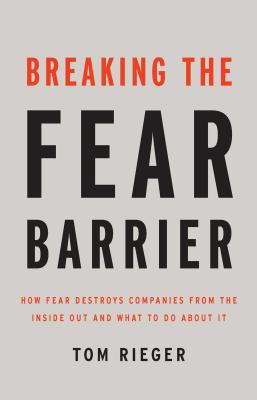Jack Covert Selects - Breaking the Fear Barrier
August 11, 2011
Breaking the Fear Barrier: How Fear Destroys Companies From the Inside Out and What to Do About It by Tom Rieger, Gallup Press, $24. 95, 220 pages, Hardcover, August 2011, ISBN 9781595620545 How people feel is not determined by the actual amount of the gain or the loss. That’s not what determines its value.
Breaking the Fear Barrier: How Fear Destroys Companies From the Inside Out and What to Do About It by Tom Rieger, Gallup Press, $24.95, 220 pages, Hardcover, August 2011, ISBN 9781595620545
How people feel is not determined by the actual amount of the gain or the loss. That's not what determines its value. Rather, the value of an outcome depends on what they expected, or their own personal "reference point." Any outcome lower than what they expected will feel like a loss—even if it's technically a gain.This is a sentence from Tom Rieger's new book, Breaking the Fear Barrier: How Fear Destroys Companies From the Inside Out and What to Do About It, and it's a great introduction to the theme of the book. When people are afraid, afraid of loss, afraid of change, they build barriers, either personally or in groups. Those barriers presumably keep those inside safe, but can cause many problems for those on the outside. Those problems, in turn, create more fear, which inspire outsiders to create their own set of barriers. Multiply this throughout a large organization, and you can understand the scope of the problem that Rieger is addressing.
As Rieger points out, not all fear is necessarily bad. It is natural, and often inspiring to be held accountable and feel the challenge to perform to the best of one's ability. But fear of losing respect, power, or anything that one feels entitled to can cause people to shut down, doing as little as they need to stay unnoticed. This, of course, does not produce growth or innovation.
Rieger calls for "barrier busting" where leaders identify what people are trying to protect, and work to shift their focus to the greater good rather than the local process. The results of this might cause some people to leave, but that's okay—maybe even necessary. As Rieger states, "Imagine a company that is fearless. And then imagine the fear its competitors would feel."
Fear is an issue that both large and small organizations experience. Breaking the Fear Barrier can help people understand how to deal with it before too many barriers get built, and how to maintain good policies and actions that don't produce fear in the first place.



